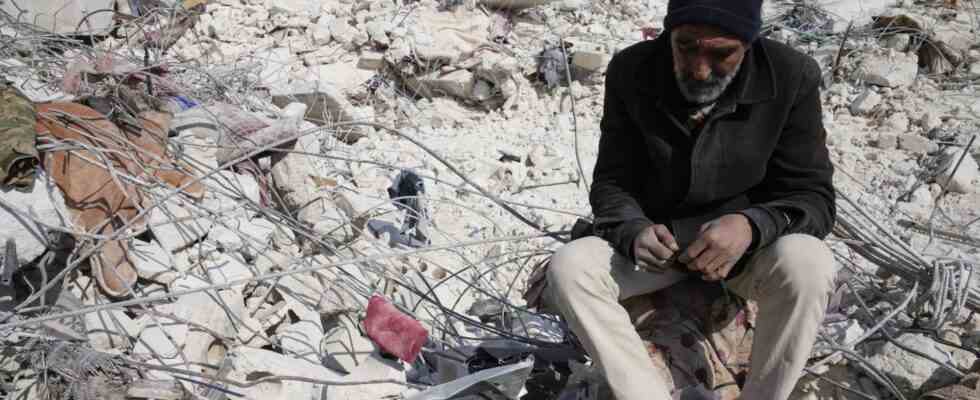Status: 02/18/2023 03:45 a.m
The Syrian government around Assad, at the urging of the United Nations, is now allowing more aid transports, and the first convoys have actually arrived. But the need is overwhelming.
A convoy of 15 trucks arrives in the city of Afrin in far northwest Syria. On the loading areas: tents, wheat and medical supplies donated by the Red Crescent in Qatar. The donation came to Turkey by air freight and from there by truck across the border to the embattled city of Afrin.
Afrin has been controlled by an Islamist militia together with the Turkish army for five years. But now the earthquake is overshadowing the civil war.
The risk of epidemics is growing
A journalist from the Reuters news agency is in Afrin, and Mohamed Salah Ibrahim from Qatar is accompanying the transport: “Many people are injured and need medical treatment. Our convoy here has everything it needs to provide first aid. And we’re bringing equipment with us, to set up mobile health stations.”
This is urgently needed, because diseases are spreading in the Syrian earthquake zone, including cholera, and the risk of epidemics is growing.
People are still missing in the ruins of the collapsed houses. Thousands of homeless people are hanging out in camps, waiting for help – like Abu Osama in the small town of Djindires, south of Afrin: “There aren’t enough pillows and blankets here. There’s not enough of everything,” he complains. “Three families have to live in each tent; there are a lot of children everywhere. We don’t get enough help. Please help us and help everyone who was hit by this earthquake.”
Help not coordinated
Help is on the way, but not enough and not coordinated. More than a hundred planes full of relief supplies have now arrived in Syria, mostly from other Arab countries. But this aid mainly reaches the earthquake victims in the area controlled by the Syrian government, such as the cities of Aleppo and Latakia.
In Idlib or Afrin, however, on the other side of the Syrian front line, less has apparently been received so far.
And as if the need wasn’t great enough, fighting flared up again in the earthquake area. The London-based Syrian Observatory for Human Rights reports that Syrian government forces have fired several shells at rebel territory, right next to the city of Atareb, which is covered in rubble after the earthquake.
Private people organize help
Nevertheless: In Syria, too, private individuals are organizing help and, despite all the roadblocks and front lines, are trying to reach their fellow countrymen in need.
Ahmed Al-Abdallah put together a convoy of 48 trucks in eastern Syria, where the earthquake hardly caused any damage, and accompanied it several hundred kilometers to northern Syria:
These relief supplies were collected by families in Deir Ezzor – for our brothers and sisters in northern Syria. We feel for them and we are now handing over our donations to them. They are donations from our people for our people.
The willingness to help is great. But the need is greater. We need a lot more help, says Abu Osama from the devastated small town of Jindires in north-west Syria. “We’re exhausted, we can’t take it anymore,” he says. “Many have lost their homes. And here are families who have lost their children. It’s tragic. We hope for help from neighboring countries so that we can get help here in this bad situation in the cold winter.”

